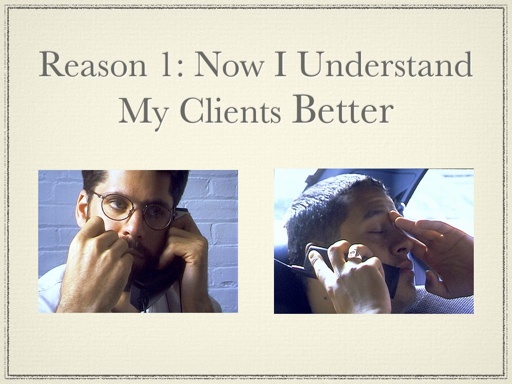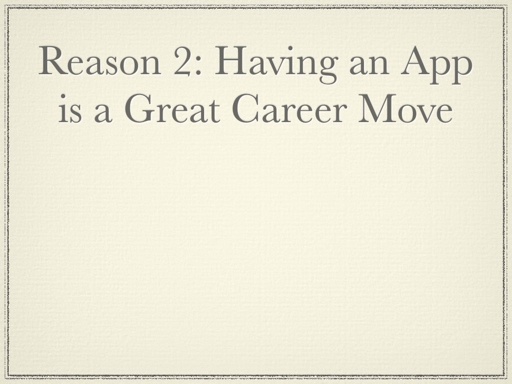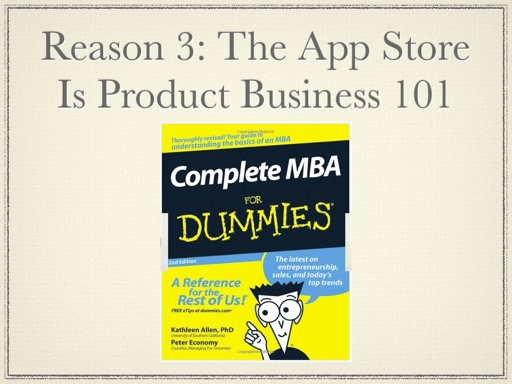PodCampHFX Remembary Presentation Part 1
Feb 23, 2011 12:29
On January 23rd 2011, I gave a talk at PodCamp Halifax called "Why You Should Have an App in the App Store Even If You Probably Won't Make Any Money". It's about my experiences in building my first iOS app, Remembary, and the first few months of trying to promote it.
Funnily enough, only a few days after I gave this talk, Remembary got a very favourable review from one of the major App Review sites, and has received a fair bit of attention in the last few weeks. If I had given this talk a few weeks later, it might have had a very different tone. However, I still believe in what I say. So here are the slides from the talk, what I said, and even some video clips of me speaking. I'll be covering the more recent news about Remembary and what I've learned since the talk in future blog posts.
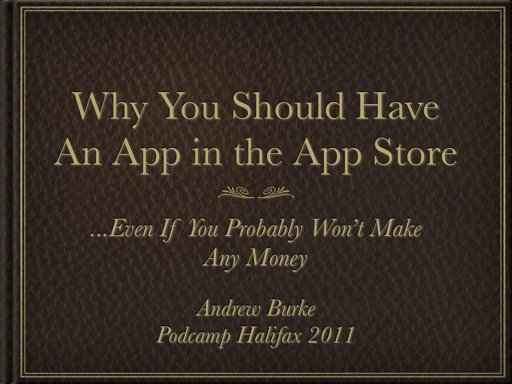
Hi I'm Andrew Burke. I've spent 15 years building software for other people - mostly web-based business applications, and mostly in Ruby on Rails, although I've done a fair bit of Java, PHP, and Lotus Notes over the years. Late last year I came out with my first iPad app - it's called Remembary.

Remembary is the first thing I've made that I have put on sale that I can truly call my own. I haven't made a lot of money from it (yet), but I have learned a whole lot. So, I'm going to tell the story of building and publishing and promoting my app - and I’ll be making several points along the way about some of the things I learned, as well as several reasons why it's still great to have an app in the App Store, even if you're not likely to become wealthy.

The stories we hear about apps are usually about outrageous successes. Just a few weeks ago, the big news story was a 14-year-old had replaced Angry Birds as the #1 iPhone game. We've all heard stories of lucky indie developers who have hit the jackpot with their apps. However, we don't often hear about the many apps that didn't make it to the Angry Birds level. This presentation will be the story of one of these more 'normal' apps.
Ever since the original iPhone App Store was announced, I had wanted to build my own apps - but client work kept getting in the way, and I didn't have time to learn a whole new language and framework. When the iPad was announced in early 2010, I was so inspired by the device that I finally sat down and started figuring out how to program it. I also had a really great idea for an app.

I've kept written diaries for years, often in quite nice hardcover volumes. It was pretty obvious that the iPad would be an ideal platform for a diary. I also came up with the idea that since it's a connected device, why not have it integrate with stuff from the internet? I'm always getting too busy to keep up daily diary entries, and I often find myself with several empty days to fill in - and I can't remember what happened last Tuesday, let alone, sometimes, this morning!
So I built Remembary: The Connected Diary for Your iPad. It's a full-featured diary app, with storage for decades of entries, quick and intuitive date navigation, and real-time search. It also lets you enter your Twitter account and up to 5 RSS feeds (and, in the latest release, Facebook feeds as well) - and it pulls down that data and organizes the items by day. That way you have external context for your day, from Twitter, Facebook, Flickr, FourSquare, Blogs, News feeds, Horoscopes, "This Day In History" etc.
I worked away at the app through the summer, learning all about iOS development making numerous false starts. I finally started making real progress in August, and the app started taking real shape in the early autumn.
This leads to the first reason that it's good to build a public, consumer-focused app: now I understand my clients better.
Over the years, I've worked with a lot of different companies, including a number of startups and other kinds of small businesses. I have to admit I often thought many of the company heads and founders were a bit crazy - certainly they were almost all neurotic and high strung, like the guys pictured here, from Startup.com.
Now I know why.
I expected that I would get a bit obsessive about the app - but I didn't expect the anxiety and the intense crazy mood swings. As the app got closer to ready, I started asking myself many of the same panicky imponderables I had heard from many customers over the years. Do I make it perfect? Or do I get it out sooner? How polished is polished enough? The page turn effect is pretty simplistic, but I don't really have time to learn about 3D texture mapping - will this make people think less of the app?
I realized that this application had become an extension of ME, so it felt like the success or failure reflected on me. What if it gets lots of attention and turns out to have some kind of bug? I would be mortified! That's the kind of half-wish fulfillment/half-paranoia worry that every Maker/Founder gets - and now I was getting it too. The sense of potential embarrassment was so palpable that I often felt like giving up - or just releasing the app and not telling anyone, so I could just get it out of my life.

I eventually got over my neuroses enough to get Remembary to a decent version 1.0 and submitted it to the App Store for approval. Remembary launched on Sunday October 17th at about 8pm (the App Store review people obviously work weekends). Unfortunately, this was the night before I was due to fly out to Toronto at the crack of dawn for an intense week of client meetings. I did manage to hit Twitter, Facebook, and my personal and business blogs with the news, for anyone who was paying attention on Sunday night.
I got a few sales up front - I'm guessing mostly from friends and family. There also seem to be automated sites that scan the store for new apps, for the kinds of people who like the latest and greatest.
The Monday after Remembary launched, I was busy with travel and client work. On the Tuesday, I went to a business networking event, and made my first public announcement and demos of Remembary. It turned out that one person was interested in the app - but three people were interested in having me build iPad apps for them!
This brings me to the next reason it's good to have an app in the App Store: it's a great career move. Many iOS developers have told me that the best way to make money in the App Store is to get other people to pay you to build apps for them.
This still applies even if you're not a developer and you're getting other people to do the coding for you: you're still someone who has taken something from conception to a saleable product.
Being a person who has built something and released it to the public puts you in a whole different tier than most people out there. You're not just a paper-shuffler who talks about what they're going to do - instead you're one of those people who Produce.

So, now I had an app in the store. Going live didn't really stop the neurosis - it just changed it a bit. The store releases new sales numbers every morning - and I found myself waking up early and hitting reload until I got my new results. Every day without sales felt like a disaster, and every day with even one sale was a festival. The funny things is, this is all about less than the cost of a coffee - but still it's an emotional rollercoaster. I guess this happens (and has always happened) in every field of retail. However, it's all amplified because you get your results daily. A lot of it is also because it was my first time - just like your first girlfriend/boyfriend, it's a bigger emotional rollercoaster because it's so new.
This leads to reason #3 why you should have an app in the App Store: It's product business 101.
App Stores (not just Apple's, but they're the big one) are in a unique space: An app store is a full-blown product market, with big names and lots of potential revenue - but the barriers to entry are quite low and the feedback is very quick.
If you wanted to, for example, build a physical product and sell it at Canadian Tire, it would be complicated, time-consuming, and expensive. It would require a lot of preliminary design, engineering, manufacturing and planning - not to mention warehousing, shipping, haggling over shelf-space, handling unsold stock, returns, recalls, etc.
Most products in the physical retail world - and this also includes things like books - require big up-front investment, often for months or years before a single item can be sold - and you often get feedback on how your sales strategies worked out only after many months.
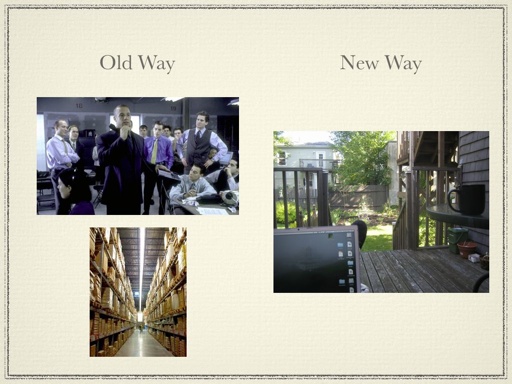
The new app store model is different: You build it yourself, or get it done by someone, using free/cheap tools and standardized components. Apple hosts it, handles payments, and puts it on their infinitely large shelves. You can set up a website, social media, and Google Adwords quickly, easily, and for very little or no up front cost. Last but perhaps most important: The feedback loop isn't measured in quarters, but in days, or sometimes even in hours.
When effect follows cause in a matter of hours, you can learn a whole lot faster.
It's comparatively easy to get an app into the App Store and in front of a potential audience, and sales and tracking move quickly, and you can get moving without spending a whole lot of money - but at the end of the day the App Store works just like any other product business. This makes it a great learning tool.
You can learn some of the same things by working in for other people, but it's a whole different game when it's your work that's on the line. It really helps focus your concentration and forces you to learn.
I think every business student - or perhaps just every student - should build an app store or web-based product and sell it. It's a hugely educational experience, and you get the rare chance to connect your work to immediate results in the real world.
In Part 2, I'll talk about some of the things I learned from having an app in the store.
